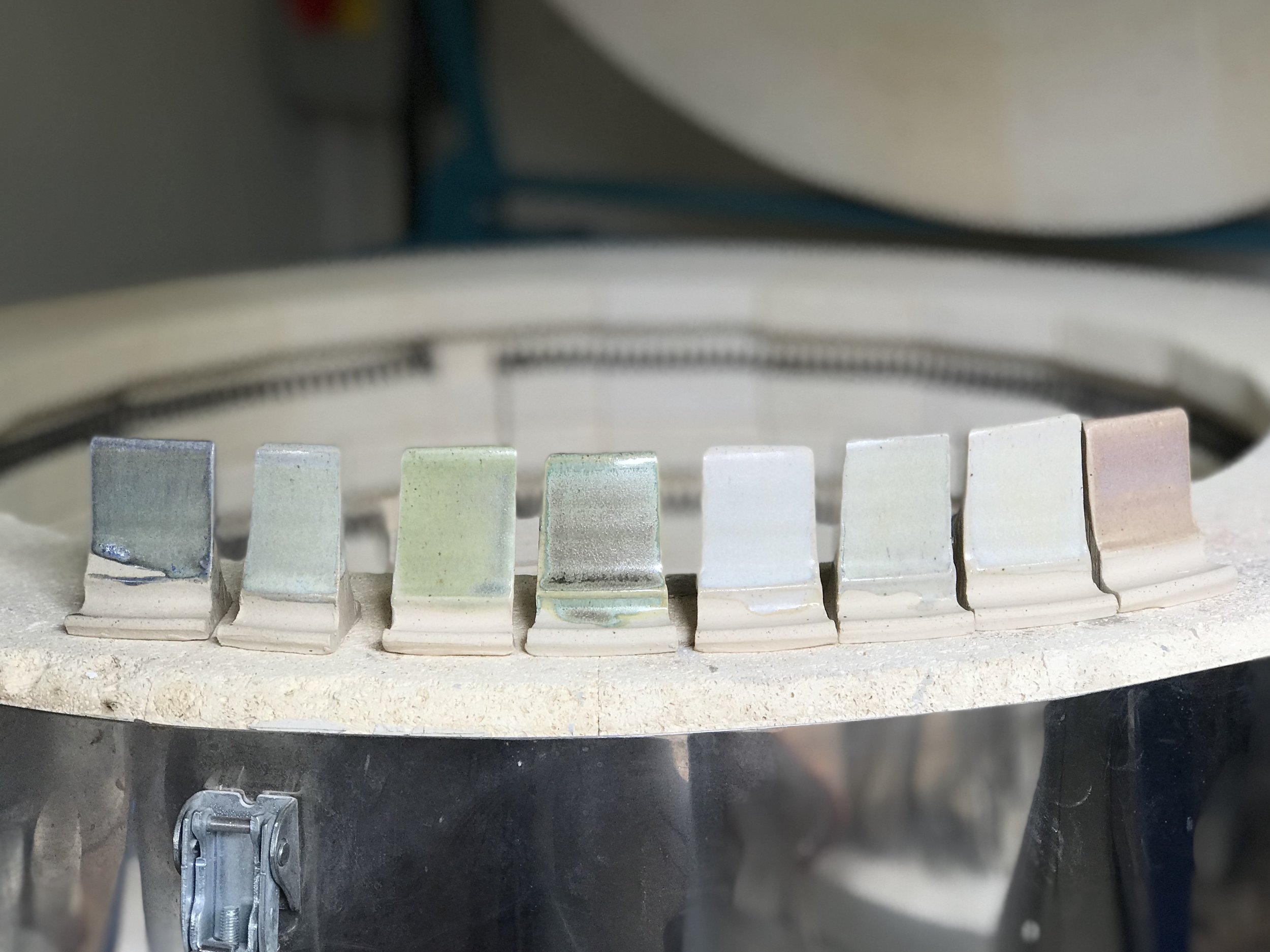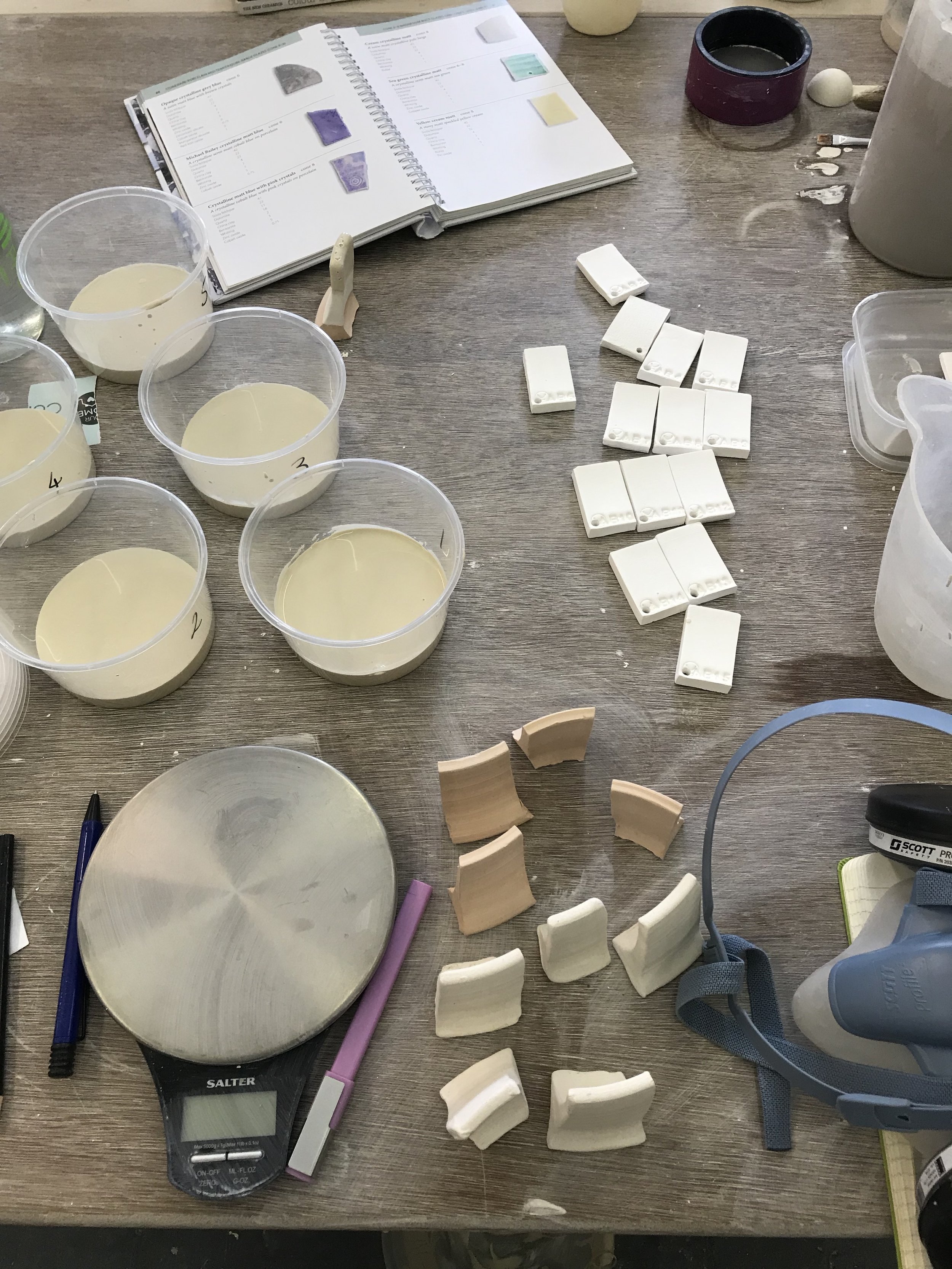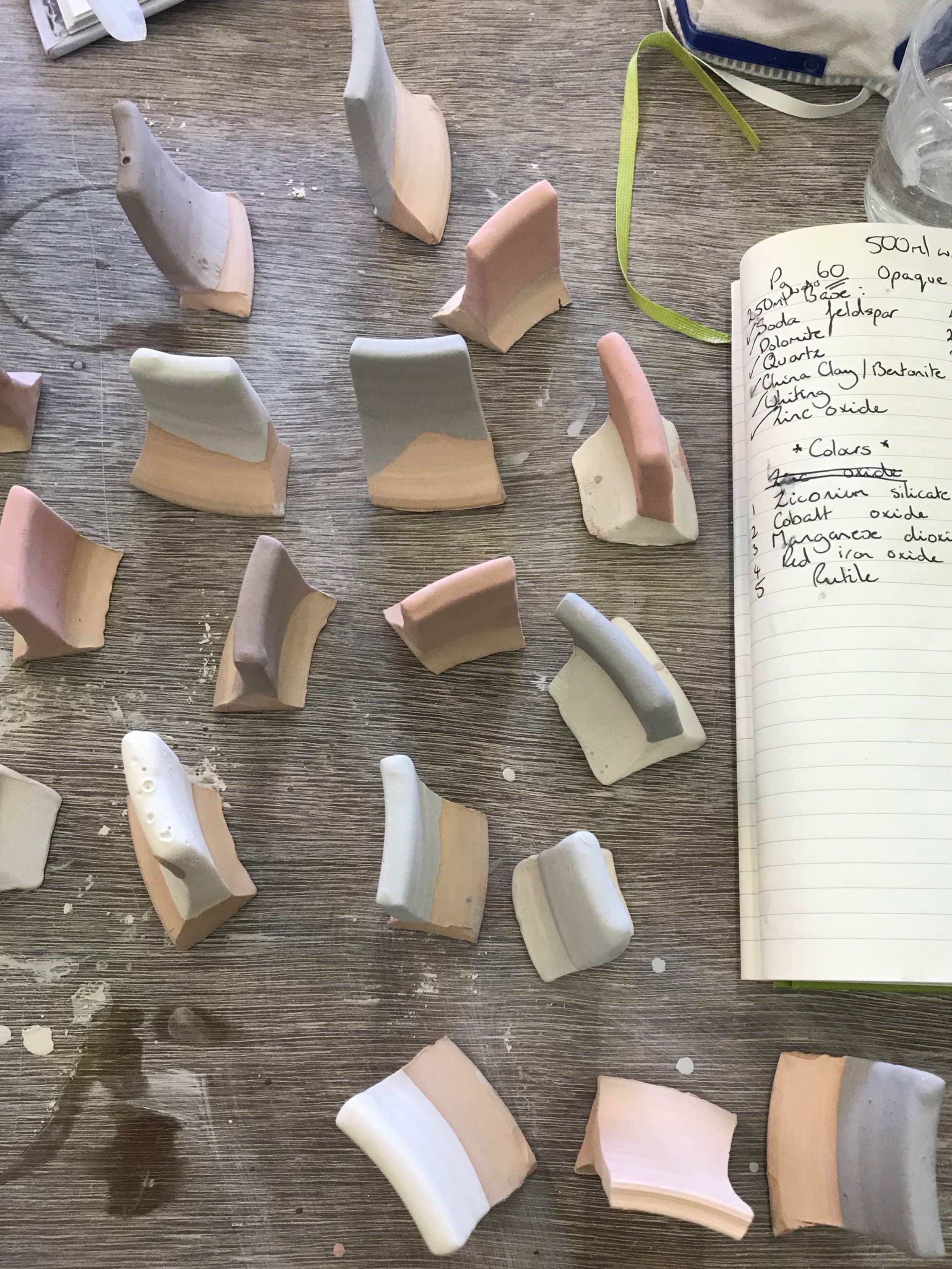The secrets and lies of creating your own glazes.
What no-one ever tells you about making your own pottery glazes...
Glaze tests fresh out of the kiln
Making your own glazes…is time-consuming. No, I mean really time consuming and just like the rest of pottery, it’s a steep learning curve, full of lessons and failures.
So, before you embark on the mamoth project of creating your own glazes ask yourself: why you want to? Is it because you want to broaden your ceramics knowledge? To deepen your understand of your craft? Because you enjoy experimenting, discovering something new? or you love a challenge and have the luxury of time and money to take a break from production to dedicate to it? Or you want to push your work in new directions. Great, amazing, crack on! Or is it because you feel like you are not a ‘real potter’ if you don’t make your own glazes? Ooffff. I am just going to leave that there a moment…
Maybe I am alone in this but I’ve have certainly been down this comparison rabbit hole. When I first started my pottery business I always looked at all the established potters on and off social media and felt like their work is ‘better’ than mine; worth more. One of the main contributing factors of this feeling was ‘their work is better because - they make their own glazes’. Is that statement really true? I am calling BS. It is true to say there are potters with more experience, deeper knowledge, more pots under their belt but of the potters who have been doing it a similar length of time and with similar knowledge? Are they ‘better’ if they make their own glazes?
Some potters fire their work once, some fire it five time. Some ceramic artists don’t use any glaze on their work at all, some only ever use one colour - does that make them not as good as someone who uses 20 different glazes in their studio? No, in fact I’d say there is an argument to say the potter that uses only one glaze is smarter! No one way is better- just different.
Testing glazes is a lot of work
Painters dont make their own paint. And making glazes is far, far harder than that - it’s not pigments you grind up with egg yolk - as potter’s we are working with chemicals, oxides, heat and time. Glaze-making is alchemy. It actually is. We are potters not chemists - so why do we all put so much pressure on ourselves to make our own glazes?
Here is the big secret that no-one tells you - most potter's - including myself will start with a base recipe that someone else has already created. They will then tweak it and add oxides and colourants to make it their own signature glazes. A small change to an oxide can make things look vastly different. This is what 99% of potters who make their own glazes do. It is still freakin hard work, the margin for error is huge, it is so much work. To test. Re-test. Test on a small batch of work. Test on a bigger batch of work. Scale it up. Trouble shoot when things inevitably go wrong…etc,etc. Glaze chemistry is a full time job. The possibilities are endless, which is all part of the magic.
Potter’s who ‘invent’ their own glazes from scratch are basically molecular chemists and go on to write books on the subject, teach courses and workshops in person/ online, sell their recipes to commercial companies - they have to monetise their efforts - and rightly so - because the time they have put into creating glazes has taken them away from making pots.
So what are the pros and cons of making your own glazes verses buying them?
The benefits of making your own are:
As the very wise Linda Bloomfield told me - You know exactly what’s in them. You don’t with commercial glazes. When you dunk your finger in a commercial glaze how do you know what you are putting your finger in? You could be absorbing anything through your skin.
They are cheaper, the raw materials are far, far more economical to buy than ready made glazes. You get far more glaze for your dollar.
Your work is totally and utterly unique to you, less copy-able (is that even a word?) - it’s much much harder for someone to replicate your look. Pretty much impossible unless you share the recipes, firing schedules and clay (FYI, dont ask me for mine-k?! ;-) Less chance of that awkward moment at the craft fair when the potter next to you uses exactly the same glazes from Potclays.
Adjustable - if you’re not happy with a colour- you can tweak it, change the maturing temperature - without knowing the ingredients you can’t.
They are future proof (to some extent) if a material manufacturer suddenly runs out of your favourite fritt you can source it somewhere else, by playing around with the UMF (Unique Molecular Formula) on glazy.org you can find an alternative. Your glaze lives to see another day. What happens if a commercial supplier stops producing your favourite best selling glaze?
On the flip side there are massive benefits to commercial glazes too:
They are quick. If you don’t have the luxury of time, then commercial glazes are for you. You find colours you like on a website, click order and bang you have a collection of beautiful glazes in a couple of days.
They have already been tested as food safe. Although there is an argument to say that every batch of work needs to be tested as it’s ‘safety’ will be reliant on your application, firing and clay type.
Results are consistent, they have already been tested through a firing before they meet your work so you know one tub is going to be exactly the same as the last.
They often have support from a manufacturer, if you encounter problems with a glaze you have used in the past you can contact the manufacturer, explain the problem and they will often work with you to find a solution/ or send you a fresh batch.
Commercial glazes are a great way to build confidence as a maker. There are so many things which can go wrong in pottery, taking out the complication of making your own glazes means you are far far more likely to end up with successful work first time- making your own glazes adds another step where things can, and often, do go wrong. If you are just starting out on your pottery journey it’s good to tackle one challenge at a time. Don’t over whelm yourself by trying to learn everything at once.
No way is the right way, it just depends on where you are at with your making.
glaze tests ready for the kiln
It’s a well known fact that many (perhaps most) top chefs don’t make their own pastry, they buy it from someone who ONLY makes pastry. Does that make them a worse cook than someone who makes it from scratch? They can do it, they just choose not to. There is power in that statement. After putting in days and days of work, hours of online research, reading books, endless messages to fellow potters on IG (sorry guys!) and many, many failures - I have made my new glazes - yippee! (which I am still perfecting - boo!;-)) but d’you know what? I will continue to use some ready made commercial glazes because they do exactly what I need them to do, create the look I want which I wouldn’t be able to recreate without spending literally years trying to match it and what would be the point of spending all that effort trying to match something that already exists?
I know the effort which goes into glaze making and I have such respect for potter’s who do it but I also want to demystified the process a bit - what it boils down to is the same in most businesses; you’re either spending money or you’re spending time; money on commercial glazes or time creating your own. Of course there is the notion that it is noble for an artist to spend years toiling away on their craft, pouring every ounce of their soul and ploughing ALL their time into their need to perfect every tiny aspect of their aesthetic (whilst at the same time not earning a dime). There is a place for this -in the 18th century!;-) As you may know from Instagram I have taken a step away from monthly shop updates of late to give myself time to experiment with a new range of glazes. But is this sustainable? No, I can’t experiment forever. I need to get back to producing work at some point. I need my pottery business to make money - it isn’t a hobby - its a business. I have a mortgage to pay. I dont want to live on lentils alone - I like lentils but I also like halloumi and wine.
Glaze making equipment
For me, the reason I wanted to create a range of my own glazes is I felt like it was time to push my work forward. I still love my original glazes but I felt it was time to refine my aesthetic. At art college lecturers tell you to go out and try as many ideas as you can, don’t hold back - experiment and learn but when the time comes you will need to pull back and put laser focus on what you are trying to say. As a painter first colour is a huge part of my work and I want to create colours with subtly and depth all at the same time. Plus I have been using the same range of glazes for about 5 years and they just weren’t exciting me as they once did.
What I am trying to say here is; don’t let that old-school boys’ club mentality make you feel like your work is any less beautiful, useful and valuable because you don’t make your own glazes. Do what suits your studio, your time, your experience, your aesthetic. Allow yourself to be a beginner if that’s what you are. No-one was born with the knowledge or skill of a potter, everyone has to learn. EVERYONE. There is no shame in buying commercial glazes - even as I type this it is cathartic for me to say it. I am sure I am not alone when I say I have spent far too much energy worrying about this.
However if you feel like making your own glazes is something you’d like to explore I have put together my tool kit of all the essential bits and bobs which I use in my studio to help me test and create glazes. (In the interest of transparency I will make a small commission if you go on a buy through the link but you don’t pay any more for the items.)
Thanks so much for reading - I’d love to know your thoughts in the comments below.
If you enjoy my blog, found it helpful or inspiring - you’re going to really love My Pottery Club
My Pottery Club is a place where I share even more insights into my pottery world - monthly real time video pottery tutorials, lessons and learnings from my 15 Years of potting, PLUS limited edition work and seconds sales. I’d love to see you there!
Happy potting!
K x





